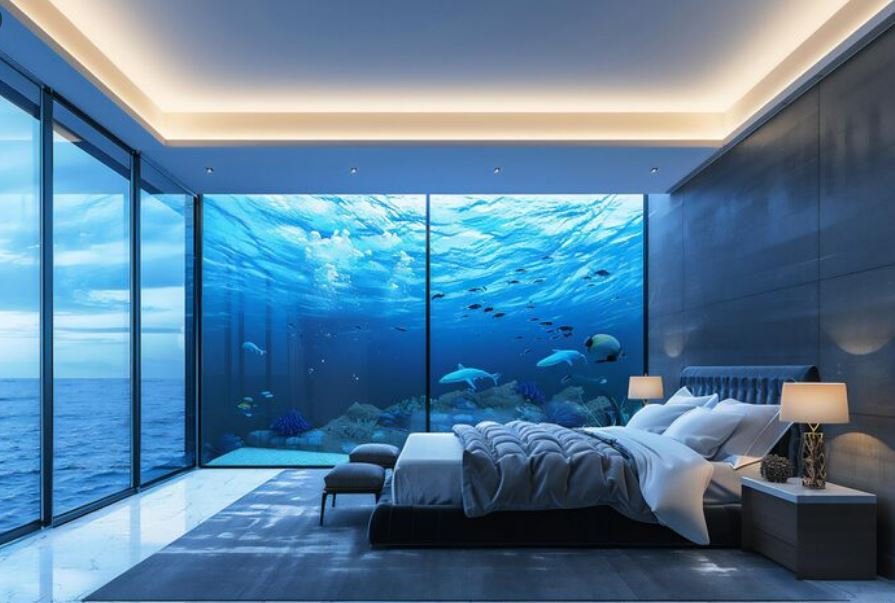
One of those unique experiences that subtly alters how tourists envision luxury, tranquility, and comfort is the underwater hotel room that feels like something from a dream. With reef fish floating past the glass as though in a tiny, private ballet, the sensation gradually intensifies, almost as though you are standing beneath a cathedral of flowing water. It’s an escape that resembles entering a lucid dream quite a bit, but it’s still based on incredibly clear architectural engineering that gives each moment a sense of intentional design.
The Conrad Maldives’ Muraka frequently takes center stage in discussions due to its submerged bedroom, which is over sixteen feet below the surface and has a curved acrylic dome that makes it difficult to distinguish between the sea and the shelter. The ocean deepens around you as you descend in a private elevator, leaving the sunlight behind. The shift is remarkably effective at calming the mind. As soon as the bedroom emerges, softly glowing in the filtered blue light, the experience is no longer something you see but something you absorb.
| Feature | Details |
|---|---|
| Name | The Muraka (Conrad Maldives) & The Underwater Room (Manta Resort) |
| Type | Luxury underwater accommodation |
| Depth | Muraka: 16.4 ft below sea level; Manta: 13 ft below surface |
| Location | Maldives & Pemba Island, Tanzania |
| Cost | Muraka: up to $50,000 per night; Manta: ~$1,500–$2,500 per night |
| Experience | Panoramic marine views, curved acrylic walls, dome ceiling |
| Key Amenities | Private elevator, underwater bedroom, sky deck, reef access |
| Conservation | Coral-reef funding via Kwanini Foundation |
| Architectural Inspiration | Modular undersea pods, ISS-style structures |
| Reference | https://themantaresort.com |
Architects created a room where marine life moves across your field of vision as easily as shadows crossing a window by incorporating acrylic panels that extend around the entire sleeping space. The rush that modern life frequently requires is greatly diminished when watching a manta ray pass overhead. Many visitors say it feels like they are floating through a dream while being steadied by the soft sway of the outside world.
An alternative form of enchantment can be found in the Underwater Room at the Manta Resort. Its three-story building, which is suspended just offshore on Pemba Island, has a peaceful rhythm of its own, rising and falling with the tides in a way that is especially helpful for those who are looking for peace and quiet. The nearly 360-degree glass surrounding the thirteen-foot-deep underwater bedroom invites reef fish to glide just inches from the bed. In the spotlights, nocturnal fish float like unanticipated companions as you lie there half-awake, straddling the line between awareness and imagination.
The experience of ascending to the sky deck is almost ceremonial. Few resorts ever manage the intimacy that comes from sprawling out under the night sky without any surrounding structures vying for visitors’ attention. The sea below adds its delicate percussion, and the stars sparkle with a brightness that is noticeably enhanced by the lack of light pollution, creating an atmosphere that effortlessly relieves tension.
Because they combine luxury and purpose, these underwater retreats have also captured the attention of tourists. The Kwanini Foundation’s support of coral-reef conservation is one way that The Manta Resort grounds its opulent experience in a sense of duty. Every night spent underwater helps to fund education, monitor the health of corals, and save marine areas that are in dire need of protection. The underwater experience feels incredibly versatile because of this structure, which was created with both beauty and purpose in mind. It is a combination of a classroom, a refuge, and a conservation tool.
The architectural creativity that went into creating these suites, however, merits special attention. After years of creating space-tourism models, Tony Webb, the creator of Planet Ocean Underwater Hotels, refined his ideas. His concept of movable underwater pods—made of steel and acrylic—that are designed to rise during storms seems especially novel at a time when climate change necessitates flexible solutions. There is a certain poetic symmetry to the notion that visitors might one day ride an elevator into a modular underwater station that mimics a submerged space habitat—exploring inner space with the same curiosity that was previously only shown for outer expanses.
As expected, social media has made these underwater fantasies popular throughout the world. When tourists record themselves brushing their teeth next to a glass wall while fish dart by, the video goes viral online. It appeals to a universal desire for experiences that are both surreal and emotionally reassuring to watch artists like Kara and Nate capture their reactions on camera: stunned, amused, and obviously overwhelmed. The dreamlike underwater hotel room soon becomes a representation of the extraordinary and a reminder that luxury can occasionally feel more like a narrative than a tangible good.
Celebrities have also subtly contributed. The Muraka is a popular choice for honeymooners who want the seclusion of a suite that is peacefully removed from the bustle of the spotlight. Others prefer The Manta Resort because of its eco-friendly appeal, which combines sustainability and personal brands in a way that is genuine and relatable. A poetic tranquility that is rarely found in conventional luxury suites is added when taking pictures with drifting reef fish as the background.
The emotional change that these underwater stays evoke is what makes them even more captivating. The sensation of being confined beneath the sea is a delicate balance between being completely alone and being completely submerged. Your mind is led into slower rhythms by the presence of the silence. A meditative loop that feels incredibly effective at regaining emotional clarity is created when you watch marine life pass your window. The ocean provides a viewpoint that is subtly transforming, moving at its own pace, steady and unconcerned.
This fascination has real advantages for places like Pemba Island. Minimal ecological stress is ensured by limited occupancy, and the profits fund reef conservation, local jobs, and tourism models that promote rather than upset the natural equilibrium. The underwater suite serves as a sanctuary and a driving force behind community-led preservation, transforming the economic impact into a shared accomplishment.
It’s not just the novelty of sleeping underwater or the memory of fish floating past glass walls that stay with visitors long after they leave these underwater rooms. It’s the feeling of being subtly brought back into contact with something more profound, such as the cadence of the water, the endurance of marine life, or the subdued reminder that wonder still exists in uncrowded areas. Because they transport us back to a state of wonder that we frequently forget to pursue, these underwater hotel rooms feel like something from a dream.
